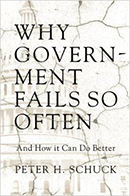Nick Gillespie reviews the new book by the author of The Death of Common Sense:
The Rule of Nobody updates and expands Howard’s original brief, and it helps to explain why government at all levels not only is on autopilot but on a flight path that can only end in disaster.
Every Philip Howard book is notable for its horror stories of regulation and systemic dysfunction, and reviewer Kyle Smith in the New York Post relates one I hadn’t heard, about the mammoth Deepwater Horizon spill:
When the oil rig started leaking mud and gas, the crew should have simply directed the flow over the side. Dumped it in the gulf. That would have been a small oil spill, of course, and no oil spill is a good thing. But in trying to avoid that, the crew caused a gigantic oil spill. Eleven lives were lost.
Safety protocol called for the men to aim the flow into a safety gizmo called an oil and gas separator, but that became backed up and made matters worse. Explosive gas filled the air around the rig, which finally exploded.
Then some workers who escaped in a raft almost died. Why? They were tied to the burning rig, and regulations forbade them to carry knives so they couldn’t cut themselves free.
More on the book here. Another review: Jesse Singal, Boston Globe.

